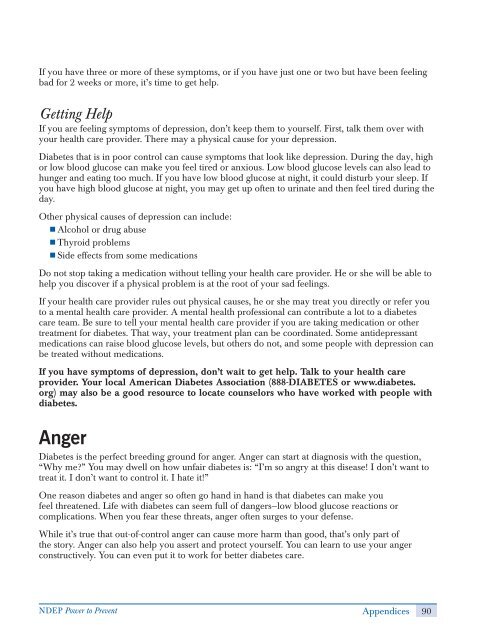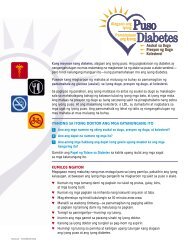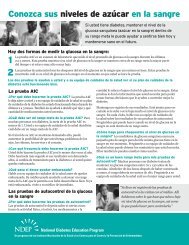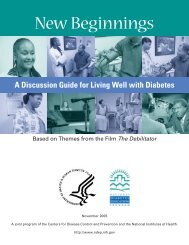Power to Prevent - National Diabetes Education Program - National ...
Power to Prevent - National Diabetes Education Program - National ...
Power to Prevent - National Diabetes Education Program - National ...
Create successful ePaper yourself
Turn your PDF publications into a flip-book with our unique Google optimized e-Paper software.
If you have three or more of these symp<strong>to</strong>ms, or if you have just one or two but have been feeling<br />
bad for 2 weeks or more, it’s time <strong>to</strong> get help.<br />
Getting Help<br />
If you are feeling symp<strong>to</strong>ms of depression, don’t keep them <strong>to</strong> yourself. First, talk them over with<br />
your health care provider. There may a physical cause for your depression.<br />
<strong>Diabetes</strong> that is in poor control can cause symp<strong>to</strong>ms that look like depression. During the day, high<br />
or low blood glucose can make you feel tired or anxious. Low blood glucose levels can also lead <strong>to</strong><br />
hunger and eating <strong>to</strong>o much. If you have low blood glucose at night, it could disturb your sleep. If<br />
you have high blood glucose at night, you may get up often <strong>to</strong> urinate and then feel tired during the<br />
day.<br />
Other physical causes of depression can include:<br />
Alcohol or drug abuse<br />
Thyroid problems<br />
Side effects from some medications<br />
Do not s<strong>to</strong>p taking a medication without telling your health care provider. He or she will be able <strong>to</strong><br />
help you discover if a physical problem is at the root of your sad feelings.<br />
If your health care provider rules out physical causes, he or she may treat you directly or refer you<br />
<strong>to</strong> a mental health care provider. A mental health professional can contribute a lot <strong>to</strong> a diabetes<br />
care team. Be sure <strong>to</strong> tell your mental health care provider if you are taking medication or other<br />
treatment for diabetes. That way, your treatment plan can be coordinated. Some antidepressant<br />
medications can raise blood glucose levels, but others do not, and some people with depression can<br />
be treated without medications.<br />
If you have symp<strong>to</strong>ms of depression, don’t wait <strong>to</strong> get help. Talk <strong>to</strong> your health care<br />
provider. Your local American <strong>Diabetes</strong> Association (888-DIABETES or www.diabetes.<br />
org) may also be a good resource <strong>to</strong> locate counselors who have worked with people with<br />
diabetes.<br />
Anger<br />
<strong>Diabetes</strong> is the perfect breeding ground for anger. Anger can start at diagnosis with the question,<br />
“Why me?” You may dwell on how unfair diabetes is: “I’m so angry at this disease! I don’t want <strong>to</strong><br />
treat it. I don’t want <strong>to</strong> control it. I hate it!”<br />
One reason diabetes and anger so often go hand in hand is that diabetes can make you<br />
feel threatened. Life with diabetes can seem full of dangers—low blood glucose reactions or<br />
complications. When you fear these threats, anger often surges <strong>to</strong> your defense.<br />
While it’s true that out-of-control anger can cause more harm than good, that’s only part of<br />
the s<strong>to</strong>ry. Anger can also help you assert and protect yourself. You can learn <strong>to</strong> use your anger<br />
constructively. You can even put it <strong>to</strong> work for better diabetes care.<br />
NDEP <strong>Power</strong> <strong>to</strong> <strong>Prevent</strong> Appendices 90













